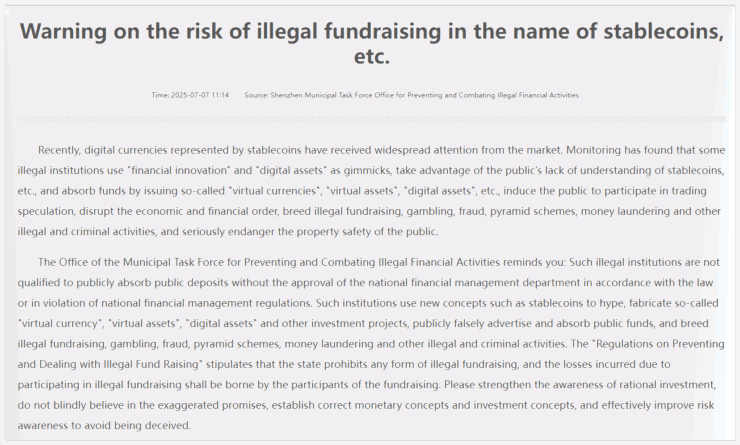Officials in Shenzhen have issued a strong warning against scams disguised as stablecoin investments, as digital assets increasingly capture public attention in China.
In a notice published Monday, the city’s Office of the Special Working Group for Preventing and Combating Illegal Financial Activities cautioned that criminal groups are exploiting people’s limited understanding of stablecoins to orchestrate elaborate fraud schemes.
“These entities exploit new concepts such as stablecoins to hype up so-called investment projects involving ‘virtual currencies’ and ‘digital assets,’” the agency said.
Authorities allege that some promoters use phrases like “financial innovation” as marketing hooks to attract unsuspecting investors into illegal fundraising, gambling rings, pyramid schemes, and money laundering operations.

The warning reflects growing concern that enthusiasm for emerging technologies—coupled with a lack of public education—has created fertile ground for unscrupulous operators to prey on consumers.
Local regulators urged residents to remain vigilant and report any suspicious activity, emphasizing that no legitimate financial product can guarantee high returns without risk.
Global Stablecoin Momentum Underscores Regulatory Gaps
Shenzhen’s cautionary stance comes as stablecoins continue to gain momentum worldwide, sparking both optimism and anxiety among policymakers.
Pan Gongsheng, governor of the People’s Bank of China, acknowledged last month that stablecoins—along with central bank digital currencies—are reshaping the global payments landscape.
In May, Hong Kong’s Legislative Council took a major step by passing a bill that will require stablecoin issuers to obtain licenses. That legislation established a formal framework to supervise and regulate the sector, which officials see as critical to protecting consumers and maintaining financial stability.
Momentum is also building in the United States, where the Senate recently approved the GENIUS Act, a landmark bill that outlines how stablecoin reserves should be managed and audited. The bill now moves to the House for further debate.
While regulators in Hong Kong and Washington have embraced licensing as a means to bring legitimacy and oversight to stablecoins, the mainland Chinese authorities remain wary.
Speaking to local newspaper Ming Pao, Christopher Hui, Hong Kong’s Secretary for Financial Services and the Treasury, said the region could issue its first stablecoin licenses within the year. However, Hui cautioned that approvals would be selective, reflecting a desire to balance innovation with strict consumer safeguards.
China Treads Carefully as Neighboring Regions Push Forward
Despite rising interest in stablecoins among Chinese consumers, the central government has shown no signs of softening its cautious approach to crypto-related activities.
China has previously banned cryptocurrency exchanges and initial coin offerings, citing concerns over financial crime and systemic risk. While the country has pursued its own state-backed digital currency, the digital yuan, authorities remain skeptical of privately issued tokens like stablecoins.
The recent advisory from Shenzhen underlines this cautious stance. Officials made it clear that any financial product claiming to offer stablecoin-linked investment returns should be treated with suspicion unless properly vetted by regulators.
Meanwhile, Hong Kong’s faster-moving regulatory framework has made it an attractive base for fintech companies hoping to develop stablecoin products under clearer rules.
Observers say the contrasting approaches between mainland China and Hong Kong could set up a unique dynamic in the region, where innovation thrives just across the border from one of the most restrictive markets.
Quick Facts
- Shenzhen authorities warned the public about stablecoin investment scams targeting unsophisticated investors.
- Hong Kong and the U.S. have both advanced landmark legislation to license and supervise stablecoin issuers.
- China maintains a cautious stance, focusing on consumer protection and financial stability over rapid adoption.





